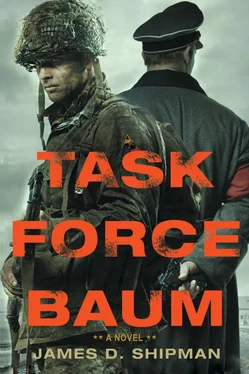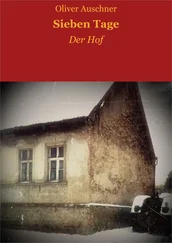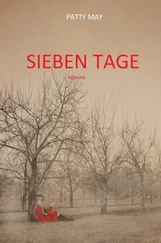He was surprised and delighted. The rumbling was not from American tanks, but rather a column of German vehicles rumbling up from behind him. His infantry company was here. The small convoy stopped behind one of the tank destroyers, and the engines sputtered to a stop. Men tumbled out of the trucks like so many industrious ants, and they passed him rapidly, spreading out among the Ferdinands and the trees, rifles already drawn and ready. A captain approached Koehl, saluting.
“Welcome.”
“Thank you,” said the captain. “What do we have coming in?”
“No idea, but plenty of whatever it is. Do you have any engineers with you?”
The man nodded. “A group, with explosives. Is that what you want us to take out?” he asked, nodding at the bridge.
“ Jawohl ,” said Koehl. “Is there time?”
“I don’t know. But let’s find out.” The captain turned and whistled. The men ran up, carrying satchels and charges. “That’s the bridge,” said the company commander. “The Americans will be here any minute. Get busy!”
The soldiers saluted as one and took off at a fast jog toward the bridge. In a matter of minutes, they were unloading charges and wires, and setting to work both above and below the bridge. Koehl scanned the highway again with his binoculars, expecting any moment that the Americans would appear. But so far, he was fortunate.
Fifteen minutes passed and then a half hour. The engineers climbed all over the bridge, a metallic anthill of activity. It seemed impossible, but minute by minute, they continued their work uninterrupted. Then, as quickly as they had started, they were scrambling away from the bridge, arms waving the signal that all was prepared.
Koehl pulled his binoculars up again. In the distance, he could see a column of green armor advancing toward them at rapid speed. They had finished just in time. He was elated. Everything had fallen into place. They were ready, and he was going to stop them cold right here at the river.
“ Hauptmann! ” He heard the shout from behind him. It was Schmidt. He raised his hand for silence; he needed to get a fix on how big the force was.
“Sir, I need you.” It was the strange quality of Schmidt’s voice that pulled him away. He turned, and the sergeant was there, his face a mottled red, tears streaming from his eyes.
“What’s wrong?” Koehl asked.
“I just heard from headquarters.” Koehl was confused. He’d never seen the sergeant look like this before, except perhaps after a battle with terrible losses. A creeping fear washed over him like a rising tide.
“What is it, Sergeant?”
“It’s Gerta.”
Koehl felt his blood freeze. “What about her?”
“She’s gone.”
Oflag XIII
Near Hammelburg, Germany
March 27, 1945, 0900 hours
Curtis stared at the hospital building in stunned silence. Lieutenant Colonel Waters held his arm tightly. He wasn’t sure if the XO was holding him up or still restraining him. Perhaps it was both. The gunshots faded, and an eerie silence settled over the camp. Curtis didn’t know how long he’d stood there now, waiting, praying, hoping for some miracle.
After an eternity, the doors to the infirmary swung open. Several soldiers came out first, men Curtis did not recognize. They were followed by Sergeant Knorr, who was coughing into a red handkerchief before he wadded the cloth up and shoved it in his pocket. He yawned and checked his watch, apparently making a great show of it. After a few moments, he looked up, staring directly at Curtis. Their eyes met and held. The sergeant’s mouth curled into a cruel and knowing smile. He nodded slightly to Curtis and turned and walked away.
The captain felt the anger boil up inside him. The bastard did it! He’d killed Hanson and every other wounded man in the hospital. What was more, he’d wanted Curtis to know it. He’d relished it. The captain was surprised by the look. He’d had a run-in with the sergeant a few months ago, but that had seemed long past.
He remembered the first time he’d met Knorr. Curtis had arrived at the camp in the early winter. They were exhausted and disoriented. The Germans had shoved and prodded the POWs through the gates, screaming in clipped, barking language as they forced the prisoners into smaller groups and pushed them through the snow to form wretched lines for roll call.
Knorr was in charge of Curtis’s group, and the captain was surprised to hear the German greet them in English.
“Greetings,” he’d shouted out, a compassionate grin on his face. “I trust your trip here was pleasant.”
There were murmurs from the men in line. Knorr’s forehead creased in concern. “What happened?” he asked. “Please tell me. Any mistreatment must be immediately reported. You may have heard rumors to the contrary, perhaps even from your commanders, but I assure you they are nothing but lies. We strictly follow the Geneva Convention here. Any deviation from those rules must be reported immediately, and we will swiftly punish the perpetrators.”
Nobody had answered.
Knorr looked around. “Please, comrades. Help us do our job.”
“We’ve hardly had anything to eat for days,” responded Curtis, deciding something had to be said. “They marched us hour after hour with no breaks and little water.”
Knorr looked over at Curtis, shock registering on his face. “This cannot be true.”
“I swear to it.”
Knorr shook his head. “What is your name?”
“Captain Jim Curtis.”
“Everyone else is dismissed to the barracks!” the sergeant commanded. Knorr gestured to Curtis. “Come with me. The Kommandant will want to hear about this immediately.”
Curtis followed the guard. His feet were frozen, and he struggled in his exhaustion to force one step in front of the other, but perhaps his luck was finally going to change. They had walked through most of the camp, and Knorr had turned toward a building near the hospital. The guard removed some keys from his pocket, whistling as he did so, and tried a number of them on a lock until he found one that opened the door. He stepped inside and flipped on the switch, gesturing for Curtis to follow him.
“Here’s our waiting area,” he explained.
Curtis had stepped in and looked around. He was surprised to find a small, bare room with a single light bulb. The space was barely six feet by six, with no furniture. He could feel a pinprick of fear on the back of his neck, but he realized there was nothing he could do.
“Just wait here for a few minutes, Captain. I’ll be right back with our commander.”
Curtis could still remember the slight twisting grin on the sergeant’s face. The German closed the door behind him and locked it. He’d been gone only a few moments when the light flipped off, obviously from outside. Curtis fumbled in the blackness until he located the interior switch, but it would not turn the light back on. He shouted and beat on the door, but nobody answered. Finally, after several hours of futile resistance, he’d given up and slumped to the floor. He’d sat that way for God knew how long, with no water, no food, shivering in the cold. Days passed. The slightest crack in one wall near the ceiling helped him distinguish between night and day. The thirst burned his throat, the agony endless. He thought he could not take a moment more, but time crept relentlessly on. He was sure he would die.
The door opened, and Knorr was there. Curtis could barely lift his head. The light turned on abruptly, and the captain blinked and groaned, fighting to see. Knorr had stepped up to Curtis, examining him closely.
“You’re still alive, I see. I checked with the Kommandant , but he was not able to see you just yet. Would you like to continue to wait?” His voice was silky and full of innocence, as if he’d just left.
Читать дальше












